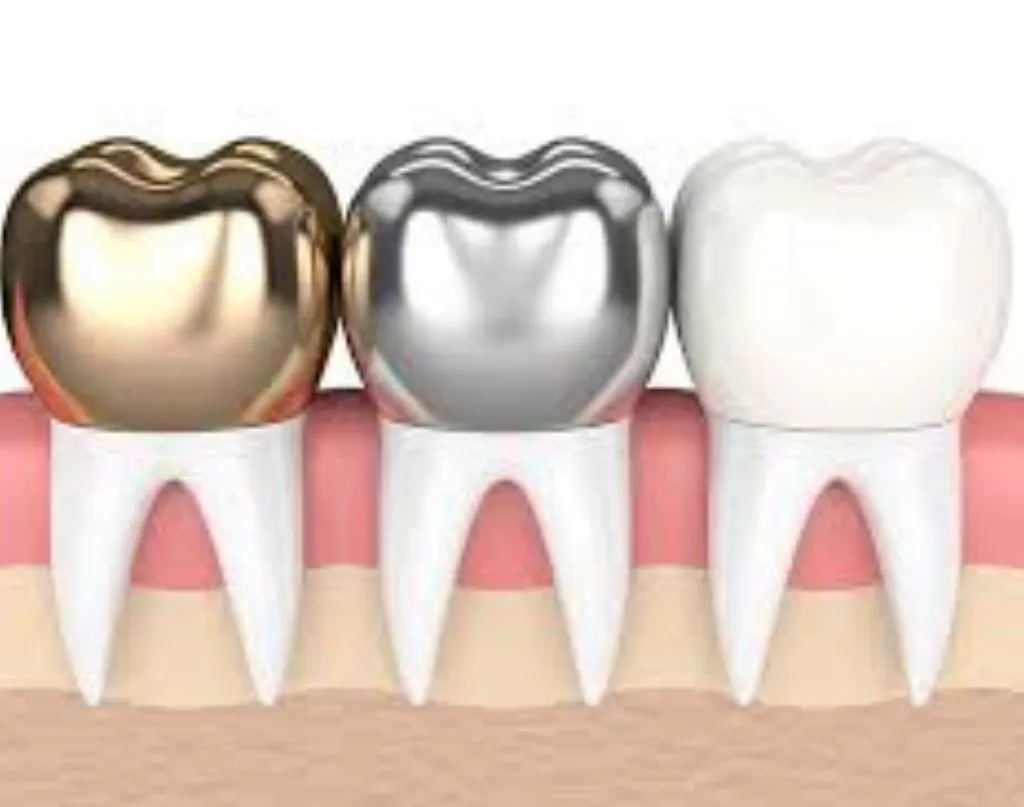Metal Dental Crowns
- Home
- Metal Dental Crowns
Metal Dental Crowns - A Comprehensive Guide
Metal dental crowns are an effective and affordable solution for restoring damaged or decayed teeth. They offer excellent durability, strength, and biocompatibility, and they can last for decades with proper care. However, they are not as aesthetically pleasing as other types of crowns, and they can cause more wear on the opposing teeth. The cost of metal crowns varies depending on several factors, but most dental insurance plans cover a portion of the cost, making them a more accessible option for many patients.
What are Metal Dental Crowns?
Metal dental crowns are tooth-shaped caps that are placed over a damaged or decayed tooth to restore its shape, size, and strength. They are one of the most popular dental restoration options available today, thanks to their durability, longevity, and affordability.
Metal dental crowns have been used in dentistry for over a century, and they have undergone significant advancements in design, materials, and fabrication techniques. They are made from different types of metals, including gold, silver, platinum, and base metals like stainless steel, nickel, and chromium.

How are Metal Dental Crowns Made?
Metal dental crowns are made in a dental laboratory by a skilled technician. The process involves several steps, which include:
Tooth Preparation: The dentist first examines the damaged tooth and removes any decayed or weakened portions. They then shape the remaining tooth structure to create space for the crown.
Impression Making: The dentist takes an impression of the prepared tooth and the surrounding teeth using a putty-like material or a digital scanner.
Crown Fabrication: The dental laboratory uses the impression to create a customized metal crown that fits perfectly over the prepared tooth. The technician uses different techniques like casting, milling, or CAD/CAM to create the crown.
Fitting and Bonding: The dentist places the metal crown over the prepared tooth and checks its fit and alignment. Once satisfied, they bond the crown to the tooth using dental cement.
What are Metal Dental Crowns Used For?
Metal dental crowns are used for several dental problems, including:
Severe Tooth Decay: When a tooth has extensive decay, a metal crown can restore its structure and prevent further damage.
Cracked or Fractured Teeth: A metal crown can hold a cracked or fractured tooth together and protect it from further damage.
Root Canal Treatment: After a root canal procedure, a metal crown can protect the treated tooth and restore its strength.
Large Fillings: If a tooth has a large filling that is weakening it, a metal crown can provide additional support.
Cosmetic Reasons: Metal crowns can be used to cover discolored or misshapen teeth for aesthetic purposes.
Pros and Cons of Metal Dental Crowns
Metal Dental Crowns Pros:
Durability: Metal crowns are highly durable and can last for decades with proper care.
Strength: Metal crowns are strong and can withstand heavy biting and chewing forces.
Affordability: Metal crowns are one of the most affordable dental restoration options available.
Minimal Tooth Reduction: Compared to other types of crowns, metal crowns require less tooth reduction during preparation.
Biocompatibility: Most metal crowns are biocompatible, meaning they don’t cause any allergic reactions or tissue irritation.
Metal Dental Crowns Cons:
Aesthetics: Metal crowns are not as aesthetically pleasing as other types of crowns since they are visible when you smile or speak.
Corrosion: Some types of metal crowns can corrode over time, causing discoloration and weakening of the crown.
Temperature Sensitivity: Metal crowns can conduct temperature changes, making them sensitive to hot and cold foods or beverages.
Allergies: Some people may be allergic to certain metals used in dental crowns, causing allergic reactions like itching, rashes, or swelling.
Different Types of Metal Dental Crowns
Metal dental crowns are made from various types of metals, each with its unique properties and advantages. Here are some common types of metal dental crowns:
Gold Crowns: Gold is one of the most biocompatible and durable metals used in dental restorations. Gold crowns offer excellent longevity, require minimal tooth reduction, and are highly resistant to wear and corrosion. They are also highly aesthetic and can last for several decades with proper care. However, they are one of the most expensive types of crowns.
Stainless Steel Crowns: Stainless steel crowns are used primarily for children’s teeth, as they are highly durable, easy to place, and cost-effective. They are not permanent and are typically used as a temporary restoration until a permanent crown can be placed.
Nickel-Chromium Crowns: Nickel-chromium crowns are a cost-effective alternative to gold crowns. They are strong, durable, and suitable for posterior teeth.
Cobalt-Chromium Crowns: Cobalt-chromium crowns are an alloy of cobalt and chromium. They are strong, durable, and suitable for both anterior and posterior teeth.
Titanium Crowns: Titanium crowns are lightweight, biocompatible, and corrosion-resistant. They are suitable for people with metal allergies or sensitivity.
Silver Crowns: Silver crowns, also known as amalgam crowns, are made from a mixture of metals like silver, tin, and copper. They are highly durable, affordable, and easy to place. However, they are not aesthetically pleasing and can cause discoloration of the surrounding teeth.
Chromium Crowns: Chromium crowns, also known as metal ceramic crowns, are made from a mixture of metal and ceramic materials. They offer excellent aesthetics and durability, making them a popular choice for dental restorations. However, they are more expensive than other types of metal crowns and can cause more wear on the opposing teeth.
Cost of Metal Dental Crowns
The cost of metal dental crowns varies depending on several factors, including the type of metal used, the location of the dental practice, and the extent of dental work required. On average, metal crowns can cost between $600 and $2,500 per tooth, with gold crowns being the most expensive and stainless steel crowns being the least expensive.
It’s important to note that most dental insurance plans cover a portion of the cost of metal crowns, making them a more affordable option for many patients.
On average, metal dental crowns can cost between $800 to $1500 per crown. Gold crowns are the most expensive, costing between $1200 to $2500 per crown, while stainless steel crowns are the most affordable, costing around $250 to $450 per crown.
Metal dental crowns are an effective and affordable solution for restoring damaged or decayed teeth. They offer excellent durability, strength, and biocompatibility, and they can last for decades with proper care. However, they are not as aesthetically pleasing as other types of crowns, and they can cause more wear on the opposing teeth. The cost of metal crowns varies depending on several factors, but most dental insurance plans cover a portion of the cost, making them a more accessible option for many patients.
If you’re considering getting a metal dental crown, it’s important to talk to your dentist about the different types of crowns available and which one is best for your specific dental needs and budget. With proper care and maintenance, a metal crown can restore your smile and dental function for many years to come.

